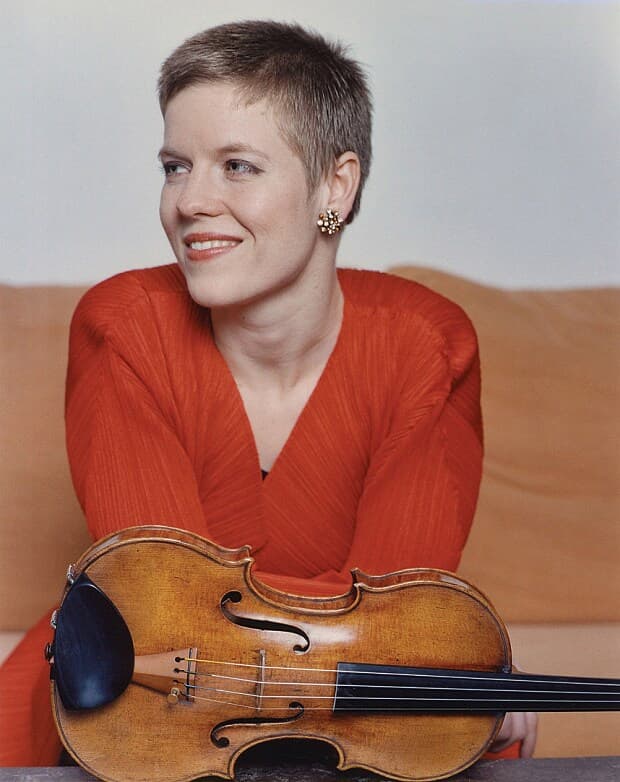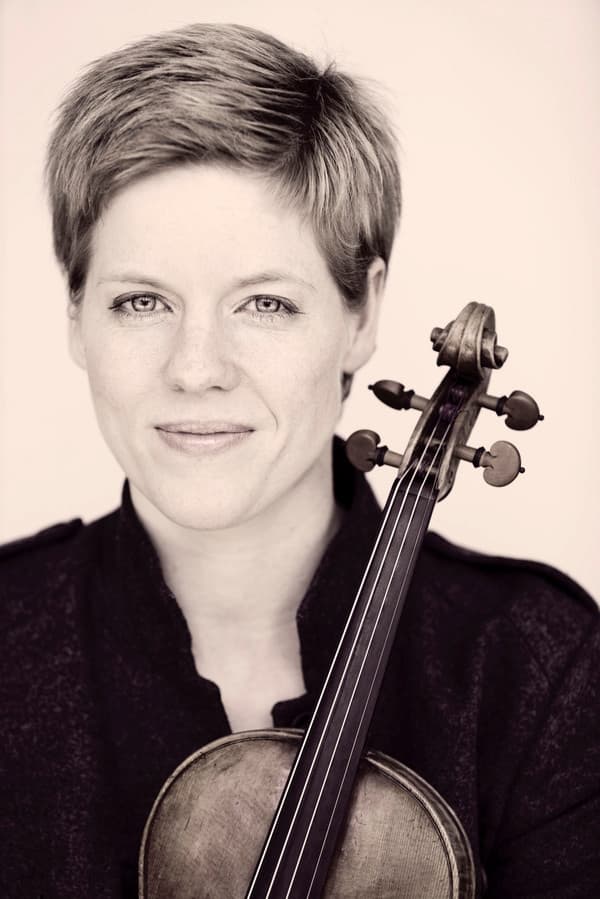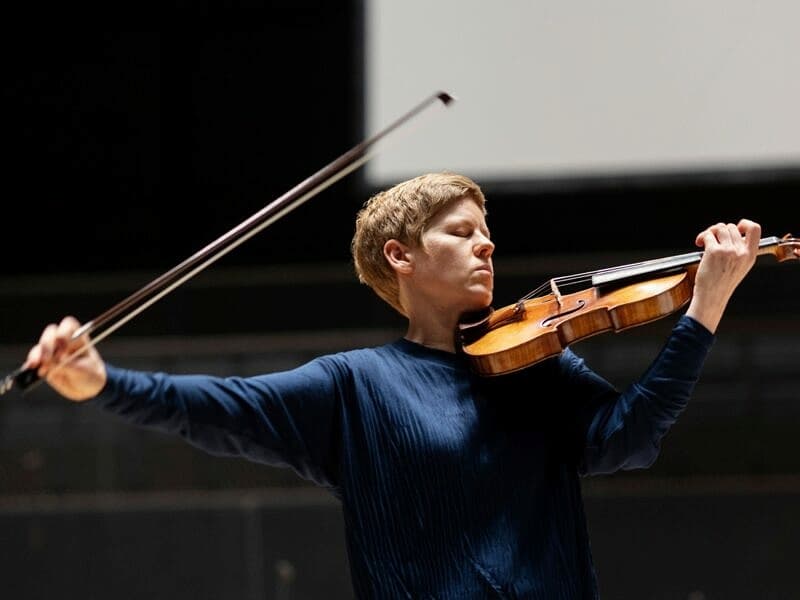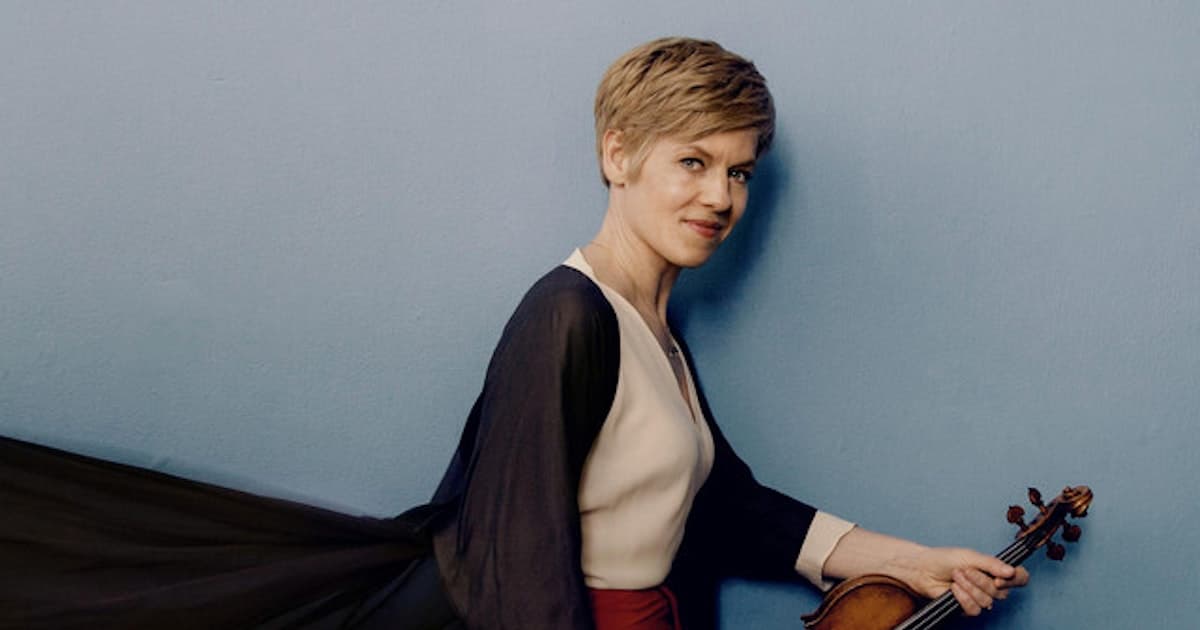Isabelle Faust was born in Esslingen, near Stuttgart, on 19 March 1972. When her father decided to take up the violin as a hobby, he took his five-year-old daughter along during his lessons. While her father only showed modest talents, his teachers quickly noticed that Isabelle mastered any and all challenges. In fact, her brother Boris also showed early promise on the violin, and soon they formed a family string quartet.

Isabelle Faust
Faust remembers, “I grew up playing second violin in a string quartet from age 11. We took it very seriously, worked every weekend, won competitions, had lessons with famous quartets like the Melos or LaSalle quartet and started playing concerts at this early age. This experience has been a fundamental one and I can’t be grateful enough to have been given the chance to discover music and develop a musical understanding and thinking based on the chamber music polyphonic understanding. And I also deeply love the intimate dialogue which is only possible between chamber music partners rather than the musicians of a huge symphonic orchestra.”
Faust/Melnikov/Queyras Perform Schumann’s Piano Trio No. 1 in D minor, Op. 63 (excerpt)

Faust honed her skills by taking lessons with Denes Zsigmondy and Christoph Poppen, and in 1987 she won first prize at the International Leopold Mozart Competition in Augsburg as the youngest entrant. Rather than enrolling in the local conservatory, Faust decided to move to Paris to gain experience in a new context. And above all, “I wanted to play and win the Paganini competition so that I never had to prove afterwards that I also have a bit of technique.” It worked like a charm, as Faust became the first German violinist to win the Paganini Competition in 1993. Major engagements in the US and Europe quickly followed, and she released her first album, a set of Bartók violin sonatas recorded with pianist Ewa Kupiec in 1997. That album earned a Gramophone magazine award for Young Artist of the Year, and further recordings earned other major prizes, including the prestigious Diapason d’Or de l’Année for a cycle of Bach‘s Sonatas and Partitas for solo violin in 2010. Faust performs on a Stradivarius violin of 1704, known as the “Sleeping Beauty.”
Isabelle Faust Performs Bach’s Sonata for Solo Violin No. 3 in C Major, BWV 1005

For Faust, there are two types of violinists. “Some love their violin as a physical object, its technical possibilities, its physicality, the thing and everything you can do with it. I belong to the other kind. Of course I also love the violin and I have high expectations of it, but for me it is not a fetish, but an instrument in the truest sense. Like the brush or pen for others, the violin is for me a tool to create a certain condition, the condition of the music. For me, the violin is the enabler of the sound, which points far beyond the instrument, even beyond myself.” Always trying to gain a better understanding of the music, Faust engages in an intensive study of autograph manuscripts, historical documents, and even love letters. “I believe that it is essential to go to the source,” she explains. “Not every composer was 100 percent sure about the final version of his work, and there are errors in first printed editions. In general, there can be all sorts of good or bad reasons for differences and discrepancies. By trying to find the ‘truth,’ I am also witnessing the genesis of the piece.”
Isabelle Faust Performs Beethoven’s Violin Concerto in D Major, Op. 61

Sometimes, it is impossible to recreate the process of a work’s creation. For Faust, the Bach unaccompanied Sonatas and Partitas belong to “the most difficult repertoire.” As she explains, “There are no love letters to read, no dedicatee, no biographical clues. To enter this kind of music one has to not only understand it intellectually but also emotionally.” The result of her deep engagement with historical context and appropriate use of her instrument provides for compelling interpretations. For Faust, music must be enjoyed without prejudice, and people who have made up their minds or rejected all classical music before actually starting to listen, often approach her. As she said in an interview, “The fact is that we only reach a very small percentage of the population with this kind of music. Still, I think the best thing we can do is make it clear that this music matters. This music is not just there to beautify this world, but simply to spiritualize mankind. It’s not just idle banter, but you can stir up so many complex things in a person that other arts rarely manage. That’s why I think that a classical musician today, and certainly before and in the future, takes on a very important role.” Faust is an advocate of modern and contemporary music, and the “public is entitled to get a larger, broader picture of the musical scenery, not just the cherries from the cake.”
For more of the best in classical music, sign up to our E-Newsletter
Isabelle Faust Performs Eötvös’ Violin Concerto No. 3 “Alhambra”
